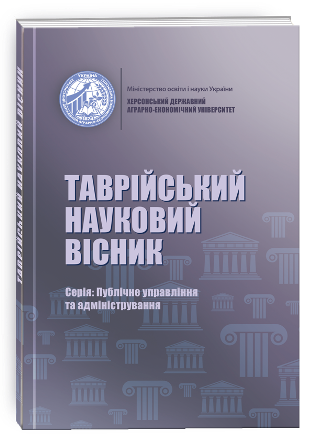PARTICIPATIVE MUNICIPAL GOVERNANCE: IMPLEMENTATION OF THE EXPERIENCE OF GERMANY IN UKRAINE
DOI:
https://doi.org/10.32782/tnv-pub.2024.2.1Keywords:
participation, municipal management, implementation, community, participation practicesAbstract
Participatory municipal management is considered in the article as one of the processes that characterizes democratic societies and allows to improve the quality of decision-making at the local level, unite the community, and create partnership relations between the community and representatives of local authorities. Activities aimed at the exchange of experience between Ukraine and Germany are represented by the cooperation of communities, holding international conferences, joint projects, networking, etc. It was determined that the practices of participatory municipal management are represented in Ukraine by establishing procedures for holding local referendums, developing participatory budgets and community program documents, creating community councils, and supporting local initiatives. Ukrainian researchers focus primarily on the limited number of procedures for involving the community in cooperation, the rather moderate level of activity of its members, the need to analyze positive experiences both within the country and in other countries. The achievements of the Federal Republic of Germany in the field of municipal management are characterized: the theoretical models of Participatory phombus (N. Kersting), "Trialog" (G. Klages), the model of participatory municipal management of the city of Leipzig, which is recognized both at the national and international levels, are considered. It is noted that the practices that can be successfully implemented in Ukraine are advocacy, lobbying, creating collaborations with public figures and opinion leaders, conducting information campaigns, working with young people, expanding the number of involved groups due to more intensive work with individual population groups. It was determined that the implementation of the experience of the Federal Republic of Germany in Ukraine involves their theoretical understanding, legal implementation, the development of organizational procedures, as well as the expansion of methods of working with the community in order to activate its potential.
References
Мамонова В.В., Довбня О.Б. Партисипативність у прийнятті містобудівних рішень органами публічного управління: зарубіжний досвід. Теорія та практика державного управління. 2019. Вип. 2. С. 191–198.
Карпенко О., Левченко О., Сакалош С. Партисипативні трансформації на місцевому рівні: електронна та цифрова демократія. Актуальні проблеми державного управління. 2019. Вип. 1. С. 111–115.
Знаткова О.М. Формування громадських компетентностей – необхідна умова розвитку партисипації в системі публічного управління в Україні. Публічне управління ХХІ століття: світові практики та національні перспективи : зб. тез XVІІІ Міжнар. наук. конгресу, 26 квітня 2018 р. Харків :Вид-во ХарРІ НАДУ «Магістр», 2018. С. 130–133.
Code of Good Practice for Civil Participation in the decision-making process. Revised: adopted by the Conference of INGOs on 30 October 2019. Civil Participation. Council of Europe. URL: https://rm.coe.int/code-of-good-practice-civil-participationrevised-301019-en/168098b0e2.
Проценко О.В. Демократія в сучасній Україні – партисипаторна чи делегативна, «сильна» чи «крихка»? Актуальні проблеми політики : зб. наук. пр. / гол. ред. С. В. Ківалов ; відп. за вип. Л. І. Кормич. Одеса : Національний університет «Одеська юридична академія» : Південноукраїнський центр гендерних проблем, 2012. Вип. 44. C. 220–229.
Чабан О.О. Переваги, недоліки та межі застосування партисипативної моделі демократії. Вісник Харківського національного університету імені В. Н. Каразіна. Серія: Питання політології. 2014. № 1091. Вип. 25. С. 38–44.
Аветисян В. Вітчизняний досвід дослідження проблематики партисипативних відносин в сучасному публічному управлінні. The 7th International scientific and practical conference «Dynamics of the development of world science» (March 18-20, 2020). Perfect Publishing,Vancouver, Canada. 2020. Рр. 233–237.
Germany. Context for Participatory Planning. URL: https://participatory. tools/before-you-start/context-for-participatory-planning-in-four-member-countries/germany-context-for-participatory-planning/.
Kersting N. Participatory Democracy and Sustainability. Deliberative Democratic Innovation and Its Acceptance by Citizens and German Local Councilors. Sustainability. 2021. Iss. 13(13). P. 7214. URL: https://www.mdpi.com/2071-1050/13/13/7214.
Lohse J. Citizen participation in Germany – some practical experiences. URL: https://www.governance-fonds.de/fileadmin/user_upload/Dokumente/Joachim_Lohse_Masterclass_Paper-ls-gl-t-en.pdf.
Edwards A., Meer J., van der. Citizen and city; developments in fifteen local democracies / H. Daemen & L. Schaap (eds). Delft: Eburon, 2000, pp. 95–109.
Souris E. Lessons from Leipzig. New America. URL: https://www.newamerica.org/political-reform/reports/lessons-from-leipzig/case-study-leipzig/.
Levytska, O., & Zapototska, V. (2017). Public participation in urban planning: German and Ukrainian experience. Journal of Geography and Environmental Management. № 45(2). Рр. 18–27.







